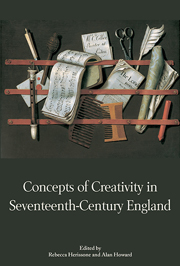Book contents
- Frontmatter
- Contents
- List of Illustrations
- List of Contributors
- Preface
- Introduction
- Creating to Order: Patronage and the Creative Act
- Creative Identity and the Role of Print Media
- Mapping Knowledge: The Visual Representation of Ideas
- Authorial Identity
- Imitation and Arrangement
- The Performer as Creator
- Bibliography
- Index
Preface
Published online by Cambridge University Press: 05 March 2014
- Frontmatter
- Contents
- List of Illustrations
- List of Contributors
- Preface
- Introduction
- Creating to Order: Patronage and the Creative Act
- Creative Identity and the Role of Print Media
- Mapping Knowledge: The Visual Representation of Ideas
- Authorial Identity
- Imitation and Arrangement
- The Performer as Creator
- Bibliography
- Index
Summary
This book has its origins in an interdisciplinary conference of the same name, held at the University of Manchester in September 2008 as part of a four-year research project entitled ‘Musical Creativity in Restoration England’, which was funded by the Arts and Humanities Research Council in the UK. The conference brought together a group of seventeenth-century specialists including those working in cultural studies, print culture, the history of ideas, and of course historians of art, architecture, theatre, literature and music, to explore how we can seek to understand what it meant to be creative in the early modern period in England. Te symposium revealed the wide variety of approaches to studying creativity being taken by scholars and research students across the humanities, and led to exciting and fruitful cross-fertilization of ideas between its participants, resulting in discussions that in some cases have led to long-lasting research collaborations.
Tis book presents a selection of twelve essays that were developed from the twenty papers given at the conference. In selecting this group, the editors have sought to include a representative sample of the research that was presented, while also aiming to ensure that the collection is accessible to a genuinely interdisciplinary readership. While music examples are used in some of the chapters, these are kept to a minimum, and are supported by audio samples available at www.alc.manchester. ac.uk/subjects/music/research/projects/musicalcreativity.
- Type
- Chapter
- Information
- Concepts of Creativity in Seventeenth-Century England , pp. xvii - xviiiPublisher: Boydell & BrewerPrint publication year: 2013

